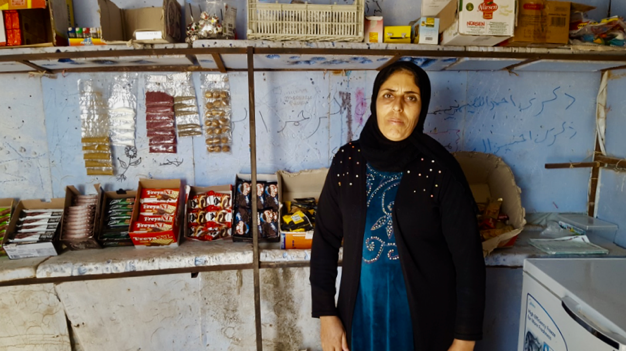A second chance for Amal and her family
Government of Japan-funded project supports resilience of refugees and host communities in IraqDate:

Amal Ahmad Mohammad lived a quiet life in the village of Hawija, in Kirkuk Governorate, 238 kilometres north of Baghdad. No more than five years ago, she and her husband were farmers.
“It was a simple and happy life,” said Amal, a 43-year-old mother of three children. Her satisfaction was in seeing her children happily playing around her and in the simplicity of village life.
“At that time, people felt rich not from money, but from kindness.”
These good times for Amal and others in her village came to an end when the Islamic State of Iraq and the Levant (ISIL) attacked her village.
Amal, who had completed basic education in her village, does not remember the year that ISIL invaded her area, but knows it as the time when her life changed forever.
The terrorist group, which in 2014 declared itself as a worldwide caliphate, controlled large parts of Iraq until it was defeated in 2017. Its rule and defeat left immeasurable destruction and bloodshed, with the United Nations concluding that the group had committed international crimes and egregious human rights abuses in the areas that it had occupied.
Amal’s village was in one of those areas.
“When ISIL came, they ruined every beautiful thing we had. We started to live in fear,” she said.
“We were always afraid of ISIL and of the bombardment. My neighbor died as a result of this bombardment.”
Amal witnessed several killings by ISIL against her community members. She also witnessed people dying due to the lack of drinking water.
This lack of water affected public hygiene and all aspects of life.
“My colourful dress became black [because of lack of washing water]. It was as if my dress was revealing my inner sadness,” Amal said.
“Day after day, I was feeling more and more depressed. I was also noticing that my husband and my children were not smiling anymore. One day, I woke up and decided that we should get out of this nightmare.”
After convincing her husband to leave their village, Amal and her family ran away one night leaving behind all their possessions. They risked being caught and killed by ISIL and were also afraid of being arrested by the army as they left the ISIL-controlled area.
Amal and her family kept going until they finally reached the Laylan camp in Kirkuk Governorate. At last they were safe, but that was not the end of their suffering.
“Life in the camp was hard because we did not have money. I had to send my kids to sell various types of things on the streets. I was worried about them. They often came back home crying because people were exploiting or mocking them.”
It was very hard for Amal to see the misery of her children, while she and her husband were unable to do much to help.
The staff of the Women Empowerment Organisation learned about Amal’s dire situation and spoke with her to see if they could offer a helping hand.
“At that moment my life started to change for the better,” she recalled.
Amal participated in a business skills development course and received a small grant for a business start-up provided by UN Women in partnership with the Women Empowerment Organization, under the “Women’s Leadership, Empowerment, Access & Protection in Crisis Response” (LEAP) project.
Funded by the Government of Japan, the LEAP project aims to strengthen the resilience of refugees and host communities by providing immediate and essential services to women affected by conflict.
Amal was one of 80 women who qualified to receive such assistance from the LEAP project over the past year, receiving training opportunities on business skills and grants to their income-generating projects.
“I was so happy. I started my project by opening a small grocery shop,” Amal said, expressing confidence that she would overcome the challenges facing her, including some people’s views that women cannot work or own a business.
“I continue to work hard even though people in the camp do not accept the idea that women can have their chances in life by working to earn money,” said Amal.
“This project saved my life and saved my children from bullies. I am now happier and more positive than ever.”